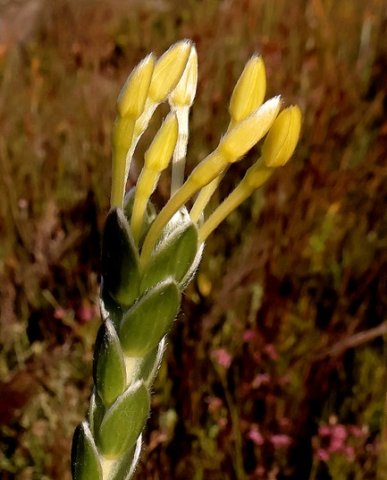Gnidia anomala

Author: Ivan Lätti
Photographer: MC Botha
Gnidia anomala, commonly known as saffron bush and in Afrikaans as aandbossie (little evening bush), is a loose, silvery shrub reaching heights from 1 m to 2 m.
The specific name, anomala, is derived from the Greek word part an- meaning not or without and the Greek word omalos meaning even, referring to plants divergence from the usual or normal.
The ovate, point-tipped leaves ascend stalkless in opposite pairs and sub-opposite whorls of four, forming four arrays up the younger stems. The densely silky blades are blue green to pale grey.
The cream to pale yellow flowers grow in few-flowered clusters at stem-tips. The long, hairy calyx tubes are narrowly funnel-shaped, ending in four ovate, pointed lobes. There are four yellowish scales like petal lobes in the calyx mouth, as well as eight stamens.
Flowering happens from spring to early summer. The aandbossie name relates to the flower fragrance exuded in the evenings.
The species distribution is along the south coast of the Western Cape from the Cape Peninsula to around Knysna.
The habitat is fynbos slopes. The species is not considered threatened in habitat early in the twenty first century (Bean and Johns, 2005; Bond and Goldblatt, 1984; iNaturalist; https://www.fernkloof.org.za; http://redlist.sanbi.org).

